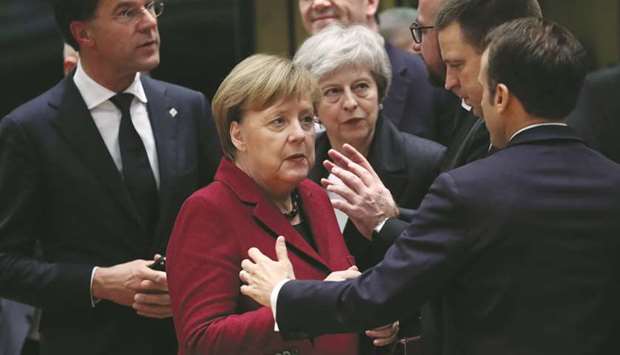EU leaders yesterday agreed on a series of reforms to the eurozone that includes plans for a specific budget for the single currency bloc, German Chancellor Angela Merkel said.
After a “controversial discussion” at an EU summit, leaders agreed on reform measures that “includes a budget for the eurozone,” Merkel said after 27 EU leaders, not including Britain, discussed the measure in Brussels.
The EU heads of state and government, minus Britain, were working from proposals thrashed out by ministers during marathon talks last week, capping 18 months of stop-start negotiations.
“This comprehensive package paves the way for a significant strengthening of the European Monetary Union,” a statement from the leaders said.
The proposals are meant to strengthen the financial plumbing of the European economy, but ignore far grander visions such as designating a eurozone finance minister or setting up a European version of the International Monetary Fund.
France considers the eurozone budget the centrepiece of the proposals, but in the final decision, it is referred to as as a budgetary “instrument” in order to soothe the anxieties of fiscal hardliners the Netherlands.
French President Emmanuel Macron, weakened by anti-government protests back home, has hailed the plans as a symbolic breakthrough towards a more closely-knit European Union.
The new budget scheme has no hard figure attached and will be linked to the seven-year overall EU budget that will be negotiated by the 27 member states over the next year.
“The features of the budgetary instrument will be agreed in June 2019,” the statement said.
The President of the european Central bank Mario Draghi told European Union leaders yesterday that growth was slower than previously forecast and urged them to move ahead with reforms of the euro zone, one official said.
Draghi briefed the leaders about the economic situation, mentioning that there was “continuing confidence with increasing caution”. Growth was lower than before, the ECB revised down the growth outlook three times this year, he said, adding wages were growing in many countries.
Draghi welcomed work done on deeper eurozone integration by eurozone finance ministers and said that a new budgetary instrument, which the leaders said be to boost competitiveness and convergence, was a step forward.
But he noted that it was important that governments played by EU budget rules, which limit the size of budget deficits and public debt and urged progress on completing the banking union that misses an EU deposit guarantee scheme.

German Chancellor Angela Merkel takes part in a European Union leaders summit in Brussels. EU leaders yesterday agreed on a series of reforms to the eurozone that includes plans for a specific budget for the single currency bloc, Merkel said.
